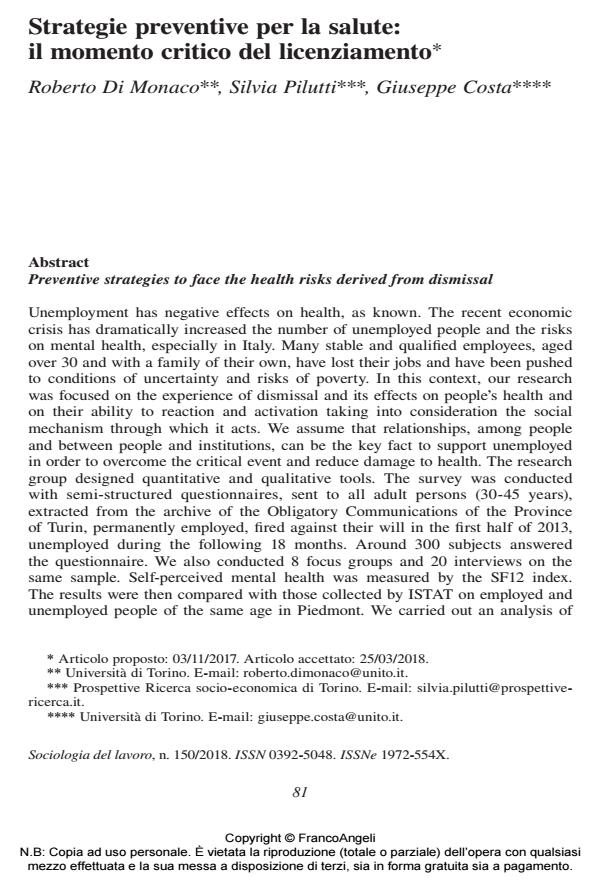Preventive strategies to face the health risks derived from dismissal
Journal title SOCIOLOGIA DEL LAVORO
Author/s Roberto Di Monaco, Silvia Pilutti, Giuseppe Costa
Publishing Year 2018 Issue 2018/150
Language Italian Pages 20 P. 81-100 File size 226 KB
DOI 10.3280/SL2018-150005
DOI is like a bar code for intellectual property: to have more infomation
click here
Below, you can see the article first page
If you want to buy this article in PDF format, you can do it, following the instructions to buy download credits

FrancoAngeli is member of Publishers International Linking Association, Inc (PILA), a not-for-profit association which run the CrossRef service enabling links to and from online scholarly content.
Unemployment has negative effects on health, as known. The recent economic crisis has dramatically increased the number of unemployed people and the risks on mental health, especially in Italy. Many stable and qualified employees, aged over 30 and with a family of their own, have lost their jobs and have been pushed to conditions of uncertainty and risks of poverty. In this context, our research was focused on the experience of dismissal and its effects on people’s health and on their ability to reaction and activation taking into consideration the social mechanism through which it acts. We assume that relationships, among people and between people and institutions, can be the key fact to support unemployed in order to overcome the critical event and reduce damage to health. The research group designed quantitative and qualitative tools. The survey was conducted with semi-structured questionnaires, sent to all adult persons (30-45 years), extracted from the archive of the Obligatory Communications of the Province of Turin, permanently employed, fired against their will in the first half of 2013, unemployed during the following 18 months. Around 300 subjects answered the questionnaire. We also conducted 8 focus groups and 20 interviews on the same sample. Self-perceived mental health was measured by the SF12 index. The results were then compared with those collected by ISTAT on employed and unemployed people of the same age in Piedmont. We carried out an analysis of the social mechanisms and of the different factors that, according to the theory, have effects on health: lack of economic resources, the crisis of social role, deterioration of relationships, etc. Social relationships have been studied to reconstruct the effects of the dismissal. Results highlight that dismissal, more than unemployment, has a negative impact on health, at least on the short and medium term. Moreover, the research shows the fundamental role of protection that social relationships have on health because people who lost their job tend to isolate themselves and feel abandoned by institutions. In this light, it would seem necessary to enhance policies aimed at creating and maintaining enabling social relations.
Keywords: Dismissal, unemployment, health, social capital, prevention
Roberto Di Monaco, Silvia Pilutti, Giuseppe Costa, Strategie preventive per la salute: il momento critico del licenziamento in "SOCIOLOGIA DEL LAVORO " 150/2018, pp 81-100, DOI: 10.3280/SL2018-150005